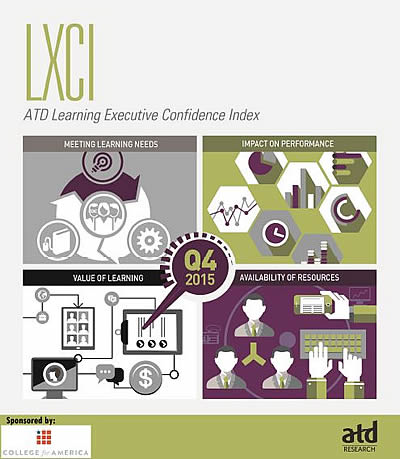ATD Blog
LXCI Shows Downturn in Learning Executive Confidence for Q4 of 2015
Fri Feb 12 2016

Learning executives’ overall confidence decreased slightly in the fourth quarter of 2015, with the Learning Executive Confidence Index (LXCI) score down to 64.3 from 68.0 in Q3. However, it appears that learning leaders are still poised to have a positive impact on corporate performance.
Each quarter, ATD Research polls learning executives on how optimistic they are about the health of learning and releases the results in a free online report, the Learning Executive Confidence Index. The report is released four times a year: in January (for Q4 of the previous year), April (Q1 of the current year), July (Q2 of the current year), and October (Q3 of the current year). It polls learning executives on their six-month outlooks for the:
ability to meet learning needs
impact on corporate performance
perception of the value of learning
availability of resources.
For a full explanation of how ATD Research derives its LXCI scores and to download the report, click here.
The LXCI shows a statistically significant (at p < 0.05) decrease in learning executive confidence since last quarter, with a drop in score for all four indicators. Confidence in ability to meet learning needs fell from a score of 70.4 to 66.5, impact on corporate performance fell from 72.8 to 68.3, perception of the value of learning fell from 70.4 to 67.4, and availability of resources fell from 58.4 to 54.9. However, despite the overall drop in scores, the LXCI shows that learning executives are still somewhat optimistic for the immediate future of the industry.
Even though 25 percent of respondents forecast having fewer available resources to meet learning needs over the next six months compared with today, the vast majority maintain a positive outlook on their ability to effect change within their organizations. Only 5 percent expect a negative effect on their ability to influence corporate performance over the same period.
The largest difference in learning executives’ confidence in their ability to have an impact on corporate performance lies in the extent of their optimism. Compared with last quarter, when 24 percent of learning executives believed they could substantially improve their impact on corporate performance, only 15 percent are extremely optimistic in Q4. Nearly half, at 49 percent, believe they will at least moderately improve their impact, roughly identical to last quarter’s 48 percent. The number who believe they will have the same impact on corporate performance six months from now rose from 24 percent to 31 percent.
Expectations for the perception of the value of learning follow a similar trend. The percentage of learning executives who believe they will substantially improve how learning is perceived in their organization fell from 22 percent to 17, but 61 percent expect to see at least some improvement, compared with 65 percent from Q3. As with learning executives’ confidence in their ability to affect performance, the proportion of executives expecting a downturn in the perception of the value of learning remained somewhat low at 8 percent, up from 5 percent last quarter.
Although we see a notable drop in score, it seems to be spurred more by a decrease in learning executives’ degree of optimism rather than an increase in pessimism. More than 60 percent of learning executives hold a positive outlook to some degree for three of the four indicators, with expectations for the availability of resources being the only indicator with less than 50 percent.
Note that ATD research sends the survey for the LXCI to learning leaders every quarter. We urge all those who receive invitations to participate in the Q1 survey for 2016 this March. The quality of the survey’s results depends on your participation.
